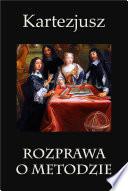Cogito ergo sum. (łac.)
Zasady filozoficzne
Źródło: 1, 7, 10
Dzieło

Rozprawa o metodzie
KartezjuszCogito ergo sum
KartezjuszKartezjusz słynne cytaty
Źródło: Przykazania etyki prawniczej: księga myśli, norm i rycin, oprac. Roman Tokarczyk, wyd. Wolters Kluwer Polska, s. 50.
Kartezjusz cytaty
„Bardzo powinny być nam podejrzane sądy przyjaciół, kiedy padają na naszą korzyść.”
Źródło: Pisma. Antologia literatury francuskiej, wyb. Tadeusz Boy-Żeleński, PIW, s. 134.
De omnibus dubitandum est. (łac.)
ulubiona dewiza Karola Marksa.
Źródło: Władysław Kopaliński, Słownik wyrazów obcych i zwrotów obcojęzycznych http://www.slownik-online.pl/kopalinski/FD32BED5578B265F412565B80004C46E.php
Źródło: Medytacja o pierwszej filozofii (1641)
Zasady filozoficzne
Kartezjusz: Cytaty po angielsku
“It is not enough to have a good mind. The main thing is to use it well.”
Wariant: It is not enough to have a good mind; the main thing is to use it well.
Źródło: Discourse on Method
Rules for the Direction of the Mind: X.379
As quoted in [Clarke, Desmond M., 2006, Descartes : a Biography, Cambridge Press, 67, ISBN 978-0-521-82301-2]
Letter to Pierre Chanut (Nov. 1, 1646) as quoted by Amir Aczel, Descartes' Secret Notebook (2005) citing René Descartes: Correspondance avec Elizabeth et autres lettres (1989) ed., Jean-Marie and M. Beysaade, pp. 245-246.
Je pense, donc je suis.
Le Discours de la Méthode (1637)
Wariant: I think, therefore I am.
Original Latin: Veritatem inquirenti, semel in vita de omnibus, quantum fieri potest, esse dubitandum
Variant translation: If you would be a real seeker after truth, you must at least once in your life doubt, as far as possible, all things.
Principles of Philosophy (1644)
Wariant: In order to seek truth, it is necessary once in the course of our life, to doubt, as far as possible, of all things.
Wariant: ... it is a mark of prudence never to place our complete trust in those who have deceived us even once.
Źródło: Meditations on First Philosophy
